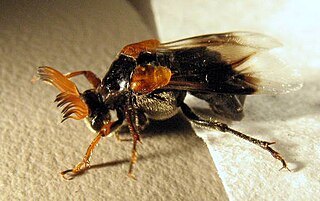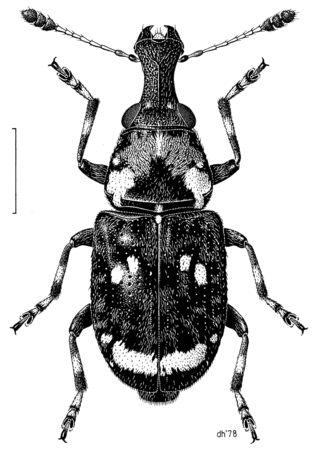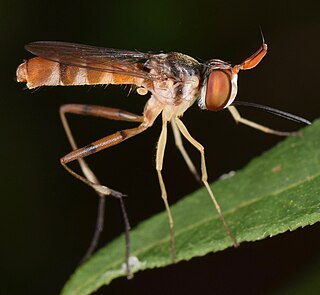
Plantaginaceae, the plantain family, is a large, diverse family of flowering plants in the order Lamiales that includes common flowers such as snapdragon and foxglove. It is unrelated to the banana-like fruit also called "plantain." In older classifications, Plantaginaceae was the only family of the order Plantaginales, but numerous phylogenetic studies, summarized by the Angiosperm Phylogeny Group, have demonstrated that this taxon should be included within Lamiales.

The Conopidae, also known as the thick-headed flies, are a family of flies within the Brachycera suborder of Diptera, and the sole member of the superfamily Conopoidea. Flies of the family Conopidae are distributed worldwide in all the biogeographic realms except for the poles and many of the Pacific islands. About 800 species in 47 genera are described worldwide, about 70 of which are found in North America. The majority of conopids are black and yellow, or black and white, and often strikingly resemble wasps, bees, or flies of the family Syrphidae, themselves notable bee mimics. A conopid is most frequently found at flowers, feeding on nectar with its proboscis, which is often long.

The Scathophagidae are a small family of Muscoidea which are often known as dung flies, although this name is not appropriate except for a few species of the genus Scathophaga which do indeed pass their larval stages in animal dung. The name probably derives from the yellow dung fly, which is one of the most abundant and ubiquitous flies in many parts of the Northern Hemisphere.

Ripiphoridae is a cosmopolitan family of some 450 described species of beetles sometimes called "wedge-shaped beetles". Ripiphoridae are unusual among beetle families in that many species are hypermetamorphic parasitoids, an attribute that they share with the Meloidae. Members of the family differ in their choice of hosts, but most attack various species of bees or wasps, while some others attack cockroaches or beetles. Many species of Ripiphoridae have abbreviated elytra, and flabellate or pectinate antennae.

Anthribidae is a family of beetles also known as fungus weevils. The antennae are not elbowed, may occasionally be longer than the body and thread-like, and can be the longest of any members of Curculionoidea. As in the Nemonychidae, the labrum appears as a separate segment to the clypeus, and the maxillary palps are long and projecting.
The World Register of Marine Species (WoRMS) is a taxonomic database that aims to provide an authoritative and comprehensive list of names of marine organisms.

Baetis is a genus of mayflies of the family Baetidae, known as the blue-winged olive to anglers. There are at least 150 described species in Baetis. They are distributed worldwide, with the most variety in North America and northern Europe.

Oberea is a genus of longhorn beetles, most of which are stem borers of various plants, including blackberries and their relatives.

Clivina is a genus of ground beetle native to the Palearctic, the Nearctic, the Near East and North Africa. There are more than 600 described species in Clivina.

Salpingidae or narrow-waisted bark beetles is a family of beetles in the superfamily Tenebrionoidea. The species are small, about 1.5 – 7 mm in length. The family is globally distributed and consists of about 45 genera and 300 species, which are generally found in the temperate regions of both hemispheres. The family is mainly associated with plants as well as with ascomycete and hyphomycete fungi. Some members of the family are associated with unusual habitats, like Aegialites and Antarcticodomus, which are found in coastal areas including the intertidal zone, with former feeding on algae.

Scirtidae is a family of beetles (Coleoptera). These beetles are commonly referred to as marsh beetles, as the larvae are typically associated with stagnant water, but can be found in flowing water. Adults prefer decomposing plant material near the water's edge. More than an estimated 600 species are known worldwide, distributed among at least 60 genera.
Anoreina is a genus of beetles in the family Cerambycidae, containing the following species:

iNaturalist is an American 501(c)(3) nonprofit social network of naturalists, citizen scientists, and biologists built on the concept of mapping and sharing observations of biodiversity across the globe. iNaturalist may be accessed via its website or from its mobile applications. iNaturalist includes an automated species identification tool, and users further assist each other in identifying organisms from photographs and even sound recordings. As of 9 July 2024, iNaturalist users had contributed approximately 197,660,888 observations of plants, animals, fungi, and other organisms worldwide, and 290,007 users were active in the previous 30 days.
Glenea biannulata is a species of beetle in the family Cerambycidae. It was described by Stephan von Breuning in 1961.
Plants of the World Online (POWO) is an online database published by the Royal Botanic Gardens, Kew. It was launched in March 2017 with the ultimate aim being "to enable users to access information on all the world's known seed-bearing plants by 2020". This was Kew's answer to the "2020 target 1" of the Convention on Biological Diversity (CBD): "an online flora for all known plants."

Micropeza is a genus of stilt-legged flies in the family Micropezidae.

Stylogaster neglecta is a species of thick-headed flies.

Physocephala tibialis is a species of thick-headed fly found throughout the eastern United States, often near flowering plants. The adult fly is primarily black with a yellow face and thin white stripes on the abdomen. It is commonly found along the east coast of the United States and is often found near flowering plants.

Latrunculia is a genus of demosponges. It is well known for the diverse array of chemical compounds found in its species, including the latrunculins, which are named after this genus. Many of these are medically important, including anti-cancer compounds such as discorhabdins.














